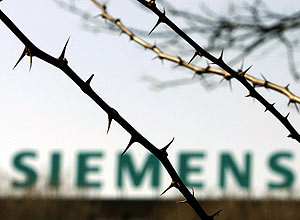Latest Photo Galleries
Brazilian Markets
12h03 Bovespa |
-0,14% | 129.028 |
16h43 Gold |
0,00% | 117 |
12h17 Dollar |
+0,39% | 5,0873 |
16h30 Euro |
+0,49% | 2,65250 |
ADVERTISING
Companies Struck Illegal Metro Deal Under Government Pressure
08/09/2013 - 08h35
Advertising
FLÁVIO FERREIRA
FROM SÃO PAULO
CATIA SEABRA AND JULIANNA SOFIA
FROM BRASILIA
The government of the state of São Paulo pushed for an illegal agreement between companies competing for the right to construct Line 5 of the São Paulo Metro, according to the diary of an executive of the German multinational Siemens, obtained by Folha.
The diary suggests that the government, referred to as 'the client', was an active participant in the negotiations between the companies competing for the contract.
It is one of the main pieces of evidence delivered by Siemens to the Brazilian authorities regarding illegal cartel formation in the bidding for construction rights in train and metro projects in the state from 1998 to 2008.
The German multinational admits participating in the cartel, though it will escape punishment in return for its cooperation with the ongoing investigations.
According to Cade (Administrative Council of Economic Defense), the federal body for antitrust law enforcement, the diary was written by the sales manager Peter Rathgeber.
The bidding in question, which began in 1998 and was concluded in 2000, related to construction rights for a 9km (5.6 mile) stretch of Line 5 between Capão Redondo and Largo Treze in São Paulo. The contract was worth nearly R$620 million (US$272 million).
| Tobias Schwarz/Reuters |
 |
| The German multinational admits participating in the cartel, though it will escape punishment in return for its cooperation with the ongoing investigations. |
Various companies competed against one another in the first phase of the bidding process, including Siemens, the French conglomerate Alstom and the Spanish company CAF. According to the diary, there were meetings between the companies following the initial bidding, aimed at forging an agreement and ending the free competition for the contract.
The entry for the 4th of November 1999 indicates that 'the client wants to ensure that the project is not endangered by complaints, requesting that participants understand one another.'
Months later the bidding process was concluded according to plan. A single consortium was formed, with the participation of Siemens, Alstom, CAF and DaimlerChrysler, which subsequently subcontracted the other companies which had participated in the bidding.
Claudio de Senna Frederico, State Secretary for Metropolitan Transport at the time of the bidding process, affirmed that neither he nor the then governor Mario Covas had 'any knowledge whatsoever of an agreement between the companies', or exercised any pressure for the settling of a deal.
Translated by TOM GATEHOUSE



